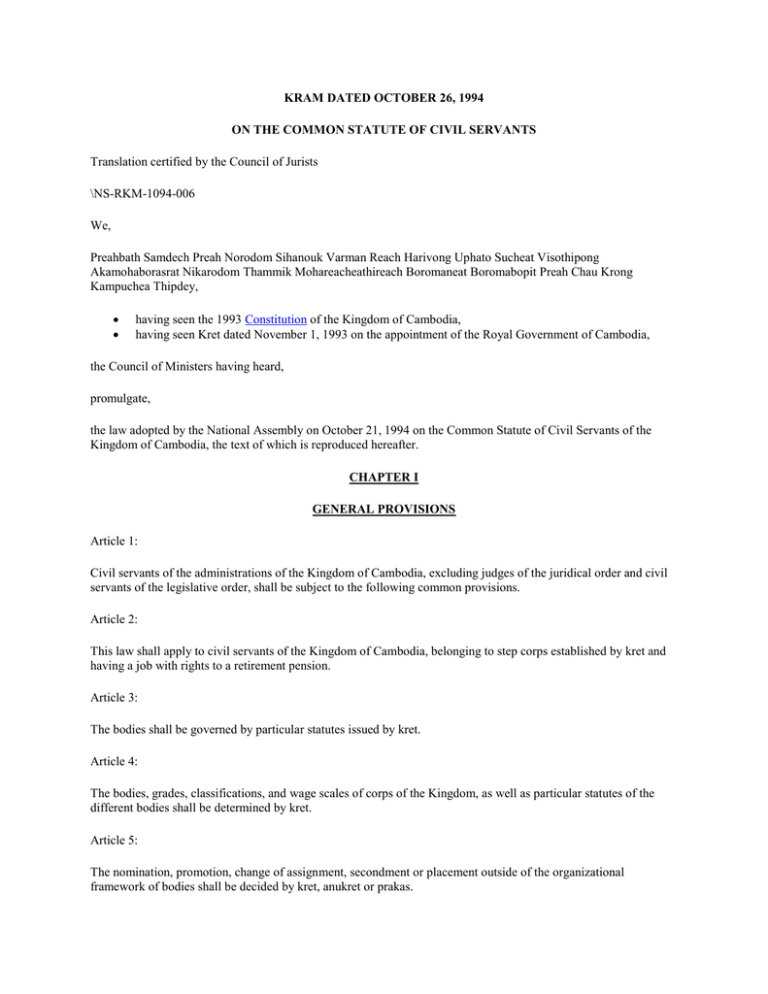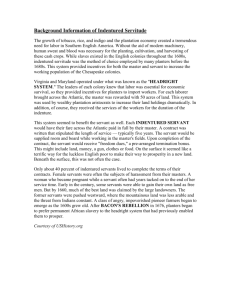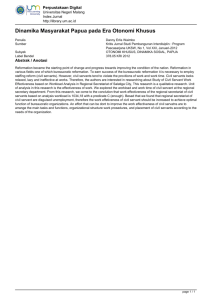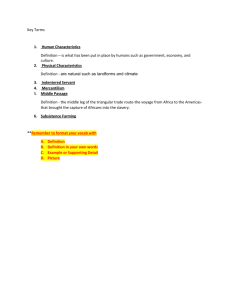Statute of Civil Servants (1994)
advertisement

KRAM DATED OCTOBER 26, 1994 ON THE COMMON STATUTE OF CIVIL SERVANTS Translation certified by the Council of Jurists \NS-RKM-1094-006 We, Preahbath Samdech Preah Norodom Sihanouk Varman Reach Harivong Uphato Sucheat Visothipong Akamohaborasrat Nikarodom Thammik Mohareacheathireach Boromaneat Boromabopit Preah Chau Krong Kampuchea Thipdey, having seen the 1993 Constitution of the Kingdom of Cambodia, having seen Kret dated November 1, 1993 on the appointment of the Royal Government of Cambodia, the Council of Ministers having heard, promulgate, the law adopted by the National Assembly on October 21, 1994 on the Common Statute of Civil Servants of the Kingdom of Cambodia, the text of which is reproduced hereafter. CHAPTER I GENERAL PROVISIONS Article 1: Civil servants of the administrations of the Kingdom of Cambodia, excluding judges of the juridical order and civil servants of the legislative order, shall be subject to the following common provisions. Article 2: This law shall apply to civil servants of the Kingdom of Cambodia, belonging to step corps established by kret and having a job with rights to a retirement pension. Article 3: The bodies shall be governed by particular statutes issued by kret. Article 4: The bodies, grades, classifications, and wage scales of corps of the Kingdom, as well as particular statutes of the different bodies shall be determined by kret. Article 5: The nomination, promotion, change of assignment, secondment or placement outside of the organizational framework of bodies shall be decided by kret, anukret or prakas. Dismissal, automatic placement into retirement and removal of civil servants shall be carried out by kret, anukret or prakas, according to the particular statutes that apply. Article 6: Each civil servant shall have the right to personnel correspondence and confidential access to all records and other documents existing in his/her file, before becoming subject to a disciplinary measure or an automatic transfer. The same right shall be granted to a civil servant in the case of a delay of his/her seniority step advancement. Article 7: If necessary, and subject to the consent of those interested, any civil servant may be placed outside his/her original body or detached outside his/her original corps in order to exercise functions in other services of the administration. Each civil servant has the right to request an assignment to join his/her civil servant spouse. Article 8: Civil servants with a given grade or classification cannot be called to serve under the direction of a civil servant with a lower grade or classification, except with such civil servant's expressed consent. Article 9: The guidelines governing leave and annual training, allowances for missions, hospitalization, and retirement, etc., shall be determined by law. Article 10: The wages of the civil servants and the allowances for duties, office supplies, water and lighting, allowances for liability and locality premiums, and allocations for family cost, accommodation, furnishing, etc., shall be determined by law. CHAPTER II RECRUITMENT OF CIVIL SERVANTS Article 11: No one may enter a body without proof of the following qualifications: 1°. must be a Cambodian citizen; 2°. must be at least 18 years old but not more than 25 years old, however, exceptions shall be made for: candidates with a diploma of higher education, in which case the age limit shall be extended to 30 years, candidates having studied a year or more of higher education without having obtained a final diploma, in which case the age limit of 25 years shall be pushed back to a length of time equal to their studies without exceeding the age limit of 30 years, candidates having effectively accomplished their military service, in which case the age limit shall be pushed back to a length of time equal to their service in the army, the ability of the Royal Government to lift, in case of necessity, by anukret, all restrictions regarding a candidate's age in order to satisfy the needs found to be priorities and in the national interest; 3°. must not be deprived of his/her civil rights, civic and political; 4°. must not have been condemned for a crime or attempted offence of good moral conduct, honor or integrity; 5°. must satisfy the conditions of physical aptitude for the exercise of the function as required by guidelines and applicable regulations; 6°. candidates belonging to ethnic minorities, coming from remote regions, as well as women, may benefit from facilities or prioritized measures of recruitment; 7°. must satisfy the aptitude conditions required by the particular statute governing his/her body. Article 12: Nationality and age shall be certified by civil status records, or by judgements in their absence. The absence of a criminal sentence shall be established by the production of a police certification prepared within the last three months, and forwarded by the Ministry of Justice. Article 13: In principle, the recruitment of civil servants shall be undertaken through competitive examination, except for contrary arrangements enacted by the Royal Government. Article 14: The date of the competitive entry examinations for a body shall be established and published three months before the preparation of the examinations. In case of emergency, this period may be reduced to 30 days. Article 15: All competitive entry examinations in the civil service shall be undertaken in the presence of a representative of the Secretary of State of the Civil Service. CHAPTER III PROBATIONARY PERIOD, PERMANENT EMPLOYMENT, REMOVAL FROM BODIES Article 16: Permanent employment with the civil service shall be allowed only at the end of a probationary period. Such obligatory probationary period may be waived by incumbent civil servants being promoted within the same group of bodies, through competitive examination or test, to a higher body than their current body. Article 17: Deductions for retirement pensions are made on the wages of trainees. These deductions shall be refunded to the trainee if he/she does not become integrated into the civil service at the end of his/her probationary period. Article 18: The duration of the probationary period is twelve months. Such period officially commences on the date of the appointment of the trainee. The probationary period is not taken into consideration if the trainee accumulates more than 30 days of absence. In this case, the trainee shall undertake a second year of probation. Permanent employment may be effected only after twelve months of effective service undertaken as a trainee by the person concerned. Permanent civil servants having passed a competitive entry examination in another body may be excused from six months of the probationary period. Such civil servants preserve the seniority acquired in the previous body. Permanent employment shall be determined by the authority having the power of appointment, on the proposal of the departmental head of the trainee. The determination shall be made upon the advice of a commission composed of the following: the Minister concerned or his/her designee (president), the departmental head concerned or his/her designee (member), the human resources manager or his/her designee (member), a civil servant of the body that the civil servant is entering (member). Any trainee that does not demonstrate a sufficient professional aptitude, or whose manner of service has been judged improper, or that is recognized to be physically unable to exercise the functions pursuant to the conditions imposed by applicable guidelines, may be, at any time, dismissed during the probationary period. This also shall be the case for any civil servant convicted of having committed one of the disciplinary transgressions found in Article 33, et seq., of this common statute. Dismissal or permanent employment shall necessarily be decided within three months following the expiration of the twelve-month probationary period. Permanent employment shall take effect, with regard to salary and promotion by seniority, on the date of expiry of the probationary period. However, seniority, as it relates to the calculation of retirement benefits, shall commence as of the beginning of the probationary period. Article 19: Any civil servant found to be unable to continue exercising his/her functions due to being physically unfit and not satisfying the conditions required to claim a retirement pension may be dismissed at any given time during his/her career. The civil servants recognized to be unfit and having a record of service greater than or equal to 20 years shall be allowed to make a claim for a proportional pension. If their record of service is less than 20 years, the civil servants known to be unfit may benefit from the full refund of their pension deductions and a subsidy from the State. Such physical unfitness shall be certified by a commission whose composition shall be as follows: the Minister concerned or his/her designee (president), the departmental head or his/her designee (member), the human resources manager or his/her designee (member), a certified physician designated by the Ministry of the Health (member), two civil servants from the same body having at least the same grade as the civil servant concerned (members). CHAPTER IV PROMOTION Article 20: A promotion in grade and class of civil servants shall be effected solely through selection or seniority. Normally, the minimum period of time required to obtain a promotion shall be two years. Any promotion shall be subject to prior inclusion in a promotions list. In the case where the civil servant is recognized for the exceptional qualities of his/her work, the promotion shall be automatic without taking seniority into account. In all bodies of civil servants, promotions shall be under the control of the nominating authority, and subject to there being job vacancies in each grade and within the limit of credits allocated by the budget. Article 21: Civil servants may, in the same grade, be promoted only to the next highest class, or if they change their grade, to the lowest step of the next highest grade. In case of a change from one civil service body to another higher ranked body through a competitive entry examination, the salary level shall be the same or immediately above the civil servant's last salary level. Promotions of grade or class shall come into effect, concerning the settlement of wages and the accounting for seniority, from the date of the promotion decision. Article 22: Each year in January, any civil servant entitled to apply for a promotion in step or grade shall fill out a professional evaluation form that shall be annotated by his/her department head. Professional evaluations of departmental heads of provinces or cities shall be submitted to the respective provincial or city Governors, that shall assess their behavior, discipline and cooperative attitude. Notices of promotion shall be addressed confidentially to the Minister or the Secretary of State concerned. Article 23: After having annotated the evaluations forms by body and order of seniority, the departmental head, the Secretary of State or the Minister concerned shall prepare a list of civil servants to be proposed for promotion. This list shall include civil servants that meet the following conditions: having at least two years of service within the grade and class on the first day of the Cambodian year from which the promotion list shall be drawn; having been proposed for promotion by the hierarchical authority to which they are attached. Article 24: Professional evaluation forms and service records of each of the civil servants placed on the lists shall be made available to the ranking committees. Article 25: The list of promotions shall be prepared by a ranking committee appointed upon the request of the department head, the Secretary of State, or the Minister. This committee, appointed by kret, anukret or prakas, shall be composed of the following: the Minister concerned or his/her designee (president), the department head concerned or his/her designee (member), the human resources manager or his/her designee (member), two civil servants of the same body as that of the civil servant subject to promotion, of a higher rank and class of such civil servant, or, failing these requirements, two civil servants of another body. The two civil servants shall be selected through an election (members). Article 26: Promotion lists shall be prepared during the fourth quarter of the Cambodian year. They shall be valid only for the next year and shall include only those placed on the list through selection. The ranking committee shall deliberate in plenary session to determine the average grade to attribute to each candidate, ranging from 0 to 20. Candidates shall be classified according to the grade they have obtained. Those placed on the list of candidates for promotion shall be considered taking into account the number of available positions. Within each civil service body, the annual number of candidates for grade and step promotions shall be determined by kret, anukret or prakas, in accordance with the number of vacant positions and budget estimates. Article 27: In the case where it is impossible to promote all of the candidates placed on the list prepared for the year, the persons concerned shall maintain the benefit of their placement and shall be placed at the top of the list for the next year unless the ranking committees decide otherwise based upon a report of the department head concerned. Article 28: To be entitled to be placed on the list of candidates for promotion, candidates must meet, on the 13 th of April of the year in which the list is established, the conditions for promotion provided in the particular statute of their body. In exceptional cases, the ranking committee may place on the promotion list the civil servants that would not have otherwise been proposed for a promotion. Article 29: Civil servants assigned to positions classified as remote, unhealthy or dangerous shall benefit from an increase of half of the seniority period required for placement on the list of candidates for promotion. Article 30: Promotions through seniority shall be alternated with promotions through selection, according to the provisions provided by the particular statutes of each body. Promotions through seniority shall be undertaken by rigorously following the order of seniority of civil servants appearing on the list of public agents proposed for promotion. Article 31: The right to a promotion, through selection or through seniority, shall be suspended for any civil servant facing judicial or disciplinary proceedings. Article 32: An honorary grade may be granted by the nominating authority to a civil servant who has retired, resigned, or has been dismissed for health reasons. The honorary grade may be granted posthumously . CHAPTER V DISCIPLINE Article 33: Each civil servant shall respect the law, regulations and instructions of his/her superiors. Each civil servant shall be responsible to his/her superior, for his/her acts likely to undermine the dignity and honor of his/her position. He/she shall carry out orders that he/she is given, and shall accept any assignment in the territory of the Kingdom or abroad. Article 34: Civil servants may not, except for legitimate reasons, cease their service or leave without having preliminarily obtaining the authorization of a qualified authority. Any cessation of service or unauthorized absence shall automatically entail either the placement on leave without pay status, or the suspension of salary; it may in addition give rise to the application of the disciplinary sanctions provided in Article 40. Article 35: It shall be strictly forbidden for civil servants: to undertake work for personal purposes during the hours of service, to use the prerogatives and authority of their position for personal profits or to threaten or violate the rights of citizens, to undertake an activity that undermines the honor and integrity of their position, to be a member of a board of directors or to manage directly or indirectly a private company or enterprise, to publish, without the prior authority of the Minister under whom they are employed, or to make public facts related to their position, to exercise at the same time a profession forbidden by the particular statute of their body. Any violation of the provisions of this Article may result in the application of disciplinary sanctions provided in Article 40 of this law, without prejudice to possible penal proceedings. Article 36: Any civil servant may join or participate in the management of an association authorized by law. Article 37: Any civil servant shall be neutral when exercising his/her functions and shall forbid himself/herself to use his/her position and the State facilities to undertake the following political activities: to work for or against a political candidate, to work for or against a political party. Any behavior contrary to this Article shall constitute a transgression or a professional breach. Article 38: Each civil servant shall consistently demonstrate a professional aptitude in the exercise of his/her duties. He/she shall be responsible for his/her transgressions and professional breaches as well as for the infringements he/she commits in the exercise of his/her duties. Article 39: Transgressions and professional breaches may result in disciplinary sanctions. Professional unqualification or inadequacy shall be sanctioned by automatic retirement if the civil servant meets the conditions established in the regulations of the Kingdom concerning the civil pension fund, or by dismissal if not so met. Article 40: Disciplinary sanctions shall be the following: First-degree sanctions: reprimand, censure recorded in the file, automatic position change through a disciplinary measure, removal from the promotion list. Second-degree sanctions: severe censure with removal from the promotion list, in case of placement on the promotion list, or postponement of promotion through selection or seniority for a prescribed period of time not to exceed two years, automatic placement on leave without pay for a duration not to exceed one year, downgrade to one or several lower grades or classes, automatic retirement or dismissal, removal. Article 41: The reprimand shall be conveyed by letter addressed to the civil servant by the head of the department, the Secretary of State, or the Minister concerned. The censure recorded in the file, the automatic position change by disciplinary measure and the removal from the promotion list shall be imposed, upon report of the department head and the person concerned having been heard, by kret, anukret or prakas following the case. Article 42: Second-degree disciplinary sanctions shall be imposed by kret, anukret or prakas, only after advice of a disciplinary council. Article 43: A downgraded civil servant shall assume his/her new class or his/her grade as of the date of the official decision regarding the downgrade. Article 44: A revocation shall have the effect of removing the functions, powers, and titles that have been conferred on the civil servant. When the removal is accompanied by a denial of the rights to a retirement pension or to the refund of a contribution to the pension fund, such denial shall be expressed in a formal decision. Article 45: Disciplinary proceedings shall be ordered by the authority having the power of nomination, upon a detailed report by the department head, the Secretary of State or the Minister. Article 46: The anukret or prakas ordering disciplinary proceedings shall entail the suspension of the functions of the charged civil servant. Such measure shall not entail the reduction of his/her salary. The disciplinary council shall be summoned within a period of one month. A decision to suspend shall be valid for only a period of three months. Except, however, this period may be extended three times by periods of one month. Article 47: All proceedings involving a disciplinary sanction of the second degree shall be preceded by a preliminary inquiry. Such an inquiry shall be entrusted to one or more representatives of the Minister concerned. Such representatives shall be in a higher grade or class or have more seniority than the civil servant charged. The file regarding the preliminary inquiry shall be transmitted to the Minister concerned who shall decide the appropriateness of bringing the charged civil servant before the disciplinary council or to declare the end of the disciplinary proceedings. In the event that the Minister concerned decides to continue the disciplinary proceedings, files shall be transmitted to the disciplinary council. The Minister shall summon the charged civil servant to receive his/her verbal or written justification. The disciplinary council shall propose, if necessary, sanctions to the Minister concerned. Article 48: The disciplinary council shall be composed of 5 members: o o three civil servants designated by the Minister under whom the charged civil servant serves, assuming notably the functions of president and reporter, two civil servants belonging to the same body as that of the charged civil servant, having a higher grade, or the same grade but having more class seniority. It shall be forbidden to appoint as a member of the disciplinary council the complainant or one of his/her relatives up to the third grade. Article 49: The member reporter shall inform the charged civil servant that he/she has the following rights: o o o o the right to review his/her personal file, the right to call witnesses, the right to choose a defender, the right to give written or verbal explanations. Article 50: After receipt of the report, the disciplinary council may request that the reporter draft supplementary information. The President may either postpone to a later date the meeting of the council or take under his/her responsibility any other measure useful to demonstrate the truth, provided that he/she does not contradict the authority of a judicial decision that has been previously entered. The procedures implementing the provisions above shall be prescribed by anukret. CHAPTER VI JUDICIAL PROSECUTIONS Article 51: The civil servant against whom a complaint is filed for a crime or misdemeanor may be prosecuted by criminal jurisdictions only after the preliminary authorization of the Council of Ministers, upon the proposal of the Minister of Justice if the civil servant's grade is the same or higher than a third-class Oudom-Montrey, or if the civil servant performs functions of the Royal Government delegate of the capital and municipalities or of the Governor of cities and provinces. The preliminary authorization to prosecute shall be granted by the Minister concerned for civil servants of a grade corresponding to a salary below that of a third-class Oudom-Montrey. In the event of in flagrante delicto, the court may order the immediate imprisonment of a civil servant without waiting for prosecutorial authorization, but shall inform without delay the Minister concerned. Article 52: If necessary, the civil servant brought before the court may be relieved of his/her duties during the judicial proceedings. In the event of a suspension of duties with placement on leave without pay status, the civil servant acquitted by the court shall be reintegrated into the civil service with retroactive effect. Article 53: Any criminal or penal condemnation without a suspended sentence shall result in the removal of the civil servant, commencing from the day when the judgement became final. In the event of an appeal, the civil servant shall be automatically placed on leave without pay. CHAPTER VII RETIREMENTS Article 54: Civil servants of both sexes shall retire by the age of 55. This age limit may be extended from 55 to 60 years by the particular statute governing a body. A civil servant shall be entitled to a retirement pension if he/she meets the following conditions: o o is 55 years of age, has 30 years of civil service. Nevertheless, a civil servant having 30 years of civil service may request retirement before the age of 55 while benefiting from his/her retirement pension. Article 55: A civil servant having at least 30 years of service shall receive a retirement pension. o o A civil servant having less than 20 years of service shall be entitled to obtain a refund of his/her pension deductions withdrawn from his/her salary as well as other State subsidies, in a lump sum payment. A civil servant having between 20 and 30 years of civil service shall be entitled to benefit from a proportional retirement pension. Article 56: No deduction for a retirement pension shall be made from salaries of a civil servant having more than 30 years of service while continuing his/her duties in the service of the State. A civil servant that serves for less than 30 years and that continues his/her duties shall continue to bear retirement pension deductions. Article 57: Seniority for a civil servant shall be calculated, with respect to the settlement of retirement pension payments, from the date of his/her entry into the service of the State, irrespective of the political regime that was then in place. CHAPTER VIII RESOLUTION OF LITIGATION RELATED TO CIVIL SERVICE Article 58: Any civil servant shall be entitled to call upon a court to handle litigation related to civil service. However, he/she shall have previously exhausted all administrative remedies. Article 59: The administrative organ having competency to deal with litigation related to the civil service shall be a permanent committee called the "Conciliation Committee on Litigation Related to the Civil Service," presided over by the Secretary of State for the Civil Service. The composition of the referenced committee shall be determined by anukret. CHAPTER IX PARTICULAR PROVISIONS Article 60: Modifications of the number and the assignments of service civil servants shall be the responsibility of the Royal Government. If necessary, staff down-sizing measures shall first target civil servants having attained the age of retirement, those being physically unfit, and candidates for voluntary departure. Article 61: In principle, positions in the civil service shall be reserved for career civil servants. Nevertheless, in exceptional cases or if necessary, the Royal Government may appoint to a given position a dignitary or a person with a degree that does not belong to any of the bodies of the civil service. In this case, the person concerned shall receive a salary from the civil service but shall not be entitled to a retirement pension . Article 62: If in the national interest, the Royal Government may appoint at any time within a civil service body of the administration a dignitary or a person with a degree without taking into consideration age limitations. CHAPTER X TRANSITORY PROVISIONS Article 63: During a period starting from the date of enforcement of this law until the year 2000, civil servants over 55 years of age may be authorized by anukret to continue to serve in the administration, at their request, upon the approval of the Secretary of State for the Civil Service and of the Minister concerned. Such continued service may be renewed for one-year periods for a total period not exceeding 5 years. CHAPTER XI FINAL PROVISION Article 64: Any provision contrary to this law is hereby void. Promulgated in Phnom Penh on October 30, 1994 On behalf of His Majesty the King and by order of the Interim Head of State Chea Sim Presented for the signature of His Majesty the King The First Prime Minister, and the Second Prime Minister Norodom Ranaridh Hun Sen Presented for the signature of Samdech Krom First Prime Minister and Second Prime Minister by the Minister in charge of the Office of Presidency of the Council of Ministers Sok An Veng Sereyvuth








